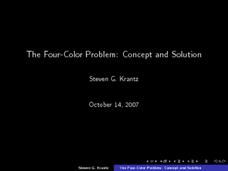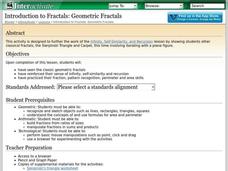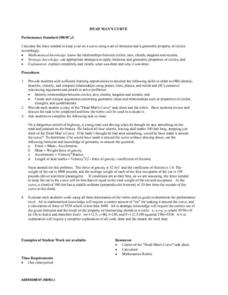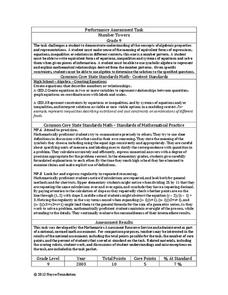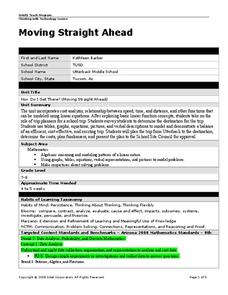Shodor Education Foundation
Volume of Prisms
Explore the concept of volume of prisms using an applet to perform the calculations. The link to the interactive applet is embedded into the lesson plan as well as a link to associated data sheets. Get your math class to the computer lab...
Illustrative Mathematics
Is This a Parallelogram?
If both pairs of opposite sides of a quadrilateral are congruent, is the quadrilateral a parallelogram? This task asks learners to determine the answer and to support their answer with a proof. The resource includes a commentary for...
Curated OER
Geometry, Measurement & Reasoning
Students construct two-column proofs. For this geometry lesson, students use deductive reasoning and geometric properties to justify given geometric statements. Students compare and contrast proofs.
Curated OER
Pythagorean Theorem Triples
Students research the concept of the Pythagorean Theorem. In this Pythagorean Theorem lesson, students use the Internet to learn about the Pythagorean Theorem. Students construct proofs of the Pythagorean Theorem.
Curated OER
Chapter 4.5 Geometry Practice Problems
In this geometry practice problems worksheet, students write geometric proofs to prove the validity of given circumstances. Students prove parallel lines, perpendicular lines, and similar angles. This four-page worksheet contains eight...
Curated OER
The Four-Color Problem: Concept and Solution
Take a walk through time, 1852 to 1994, following the mathematical history and development of the Four-Color Theorem. Learners take on the role of cartographers to study an imaginary world of countries that need to be...
Curated OER
Fractions and Paper Folding
In this fraction lesson, students manipulate paper by folding it to create different shapes and sizes, they explore the concept of fractions, and discuss their observations as a class. This is a great lesson for getting students...
EngageNY
Solve for Unknown Angles—Angles and Lines at a Point
How do you solve for an unknown angle? In this sixth installment of a 36-part series, young mathematicians use concepts learned in middle school geometry to set up and solve linear equations to find angle measures.
College Board
Why Variances Add - And Why It Matters
Why is adding variance important? A lesson outline defines a variance theorem and how it affects the data statistics. The instruction shows scholars the importance of considering the variance of data and why it requires independence.
Thomson Brooks-Core
Complex Numbers
A straightforward approach to teaching complex numbers, this lesson addresses the concepts of complex numbers, polar coordinates, Euler's formula, De moivres Theorem, and more. It includes a practice problems set with odd answers...
Curated OER
Math: Equal Area Triangles
Students examine a math worksheet and determine how to divide a single triangle into four of equal area. Using geometric principles, they sketch two additional ways to divide into into four equal triangles. To conclude, students...
Curated OER
Math: A Geometric Neighborhood
Students, as a final project, draw a picture of their ideal neighborhood on a sunny day. In addition to the sun, their drawings include homes, trees, streets, and selected objects. Each object in their drawing has a written description...
Curated OER
As the Bird Flies
Learners investigate the properties of lines and congruent triangle theorems as well as apply geometric properties and relationships to real-world mathematical problems. Given two different scenarios, they examine maps that have been...
Curated OER
Line and Shape Game
Learners play the "space-breaker" game, in which they are required to create a picture using shapes or lines called out to them) to reinforce the concept of geometric shape and line.
Curated OER
The Premises of Geometry
In this geometry activity, students solve for missing midpoints, segments and angles using algebraic equations. They use geometric properties to solve these equations. There are 32 questions on 7 different worksheets.
Curated OER
Introduction to Fractals: Geometric Fractals
Students explore the concept of fractals. In this fractals lesson, students discuss Sierpinski's Triangle using an applet. Students discuss the patterns involved with fractals. Students discuss the area of Sierpinski's triangle as the...
Inside Mathematics
Magic Squares
Prompt scholars to complete a magic square using only variables. Then they can attempt to solve a numerical magic square using algebra.
Curated OER
DEAD MAN'S CURVE
Ninth graders, after being given a unique scenario and a task sheet on Dead Man's Curve, calculate and explain the force needed to keep a car on a curve using a set of formulas and a geometric property of circles. They utilize and create...
Inside Mathematics
Number Towers
Number towers use addition or multiplication to ensure each level is equal. While this is common in factoring, it is often not used with algebraic equations. Solving these six questions relies on problem solving skills and being able to...
Curated OER
Worksheet 37
In this math worksheet, students examine the similarities between three-dimensional geometric vectors and Fourier series. Then they write proofs for some of the equations.
Curated OER
Recursion on a Calculator
In this math worksheet, students investigate repeated values on the calculator. They also read the explanation of the golden triangle and its proof.
EngageNY
Addition and Subtraction Formulas 1
Show budding mathematicans how to find the sine of pi over 12. The third lesson in a series of 16 introduces the addition and subtraction formulas for trigonometric functions. Class members derive the formulas using the distance...
Curated OER
Polygons All Around Us!
Students explore the concept of polygon properties. In this polygon properties lesson plan, students draw polygons with different numbers of sides such as pentagons, octagons, hexagons, etc. Students identify different geometric shapes...
Curated OER
Moving Straight Ahead
Students analyze the relationship between speed, time and distance. In this math lesson, students plan a school trip. Students determine the efficiency and cost effectiveness of a trip.







